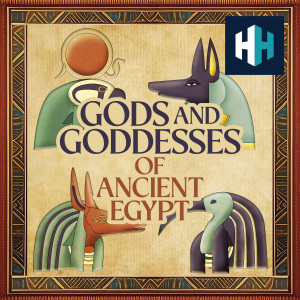The sun rises in the east and sets in the west. The Nile flows north and the wind blows south. These things will always be.

Hot off the end of the Greek Gods and Goddesses series on the HistoryHit original series The Ancients, we’ve been contributing stories to a new series on Egyptian Mythology.
Released over September and October 2024, the series has charted the birth of the gods all the way through to myths about the gods of death. Every episode in the series has begun with one of these scripts – a single self-contained myth. We’ve used many of the same storytelling techniques as we did for the Greek Gods and Goddesses series.
But our stories for this series are also a bit different. We’ve written a container narrative here for the Helicon website to accompany each of the voice-acted myths on the podcast. This narrative follows the tale of young Senu, a soon-to-be pharaoh, as he learns about the gods and how their myths will help him secure his throne during a particularly chaotic time in Egypt’s history. The format apes the Ancient Egyptian dialogic genre known as ‘Instruction’ or ‘Wisdom’ texts where a mentor – even a god (*cough* no spoilers *cough*) – imparts knowledge on a youth.
Getting to dive deeper into characters, charting their growth from one story to the next, was a really satisfying mix-up from the Greek Gods format where we only got to spend a couple hundred words at most with one character or another. As such, Senu – bright-eyed but anxious, hopelessly naive but with the weight of all Egypt on his shoulders – has quickly become one of our favourite protagonists. His story is loosely based on the lives of various pharaohs in the Twelfth Dynasty (the high-water mark of the Middle Kingdom). His name is based on Senusret (also pronounced Senwosret) – a name shared by three separate pharaohs within the Twelfth Dynasty.

But the series was not without its challenges. Egyptian myth is a far cry from Greek. It’s more fragmentary, more disputed and significantly less formalised; the closest thing to an Iliad or an Odyssey – i.e. texts that could be considered foundational, if not canonical – is The Contendings of Horus and Seth, and that’s pushing it. Egyptian myth seems more metaphorical and abstract too, though there’s probably a good debate here on whether that’s because Greek myth, like Abrahamic stories, is simply our English, cultural backdrop, making the wilder stories of Greek myth seem more normal (we’re looking at you Zeus as a golden shower…). What Egyptian myth definitely is, though, is more divorced from the human; we barely feature in the stories of gods. Even our origin is incidental – we’re tears shed by Atum about his actual, divine children. This is why we brought Senu into the stories: to help ground these abstract myths in a human drama.
The series has run over five weeks (September–October 2024), covering the origins of the Ennead (the Egyptian answer to the Olympians essentially); the various aspects of the sun god(s); the great goddesses; the betrayal of the pharaoh king Osiris; and finally the underworld and its guard dog (literally), Anubis. Each myth has been brought to life by voice actor Meena Elbezawy.
After the story, the series has featured in-depth interviews between The Ancients’s host Tristan Hughes and two eminent academics – Joyce Tyldesley (whose The Penguin Book of Myths and Legends of Ancient Egypt was one of our primary sources) and Campbell Price. Together they’ve dived into the history, art, mythology and reception of each god and goddess. Huge thanks also go to Senior Producer Anne-Marie Luff and Assistant Producer Joseph Knight for pulling the episodes together (and commissioning us!).
Every script and links to the relevant podcast recordings can be found here.
All that’s left to say is once again a huge thank you to the team at HistoryHit and to you for listening!
Your blog is a constant source of inspiration for me. Your passion for your subject matter shines through in every post, and it’s clear that you genuinely care about making a positive impact on your readers.
Your writing has a way of making even the most complex topics accessible and engaging. I’m constantly impressed by your ability to distill complicated concepts into easy-to-understand language.